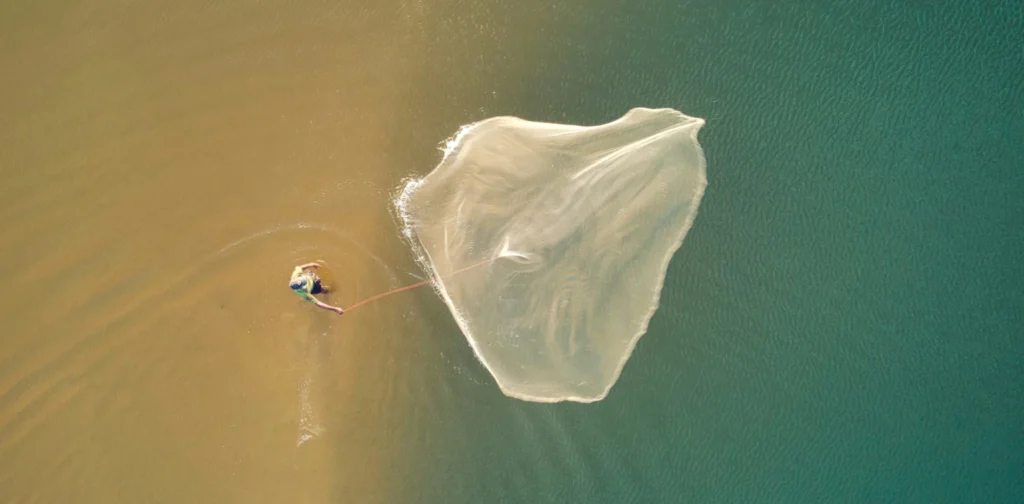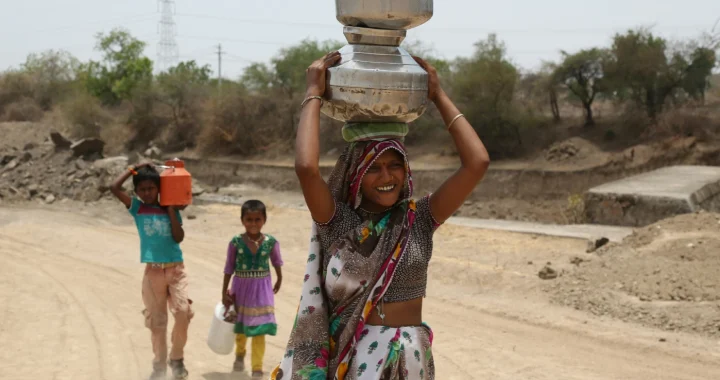Involving Coastal Communities in Tackling Ghost Nets Pollution

Photo: lahiru iddamalgoda on Unsplash.
Ocean pollution impacts our seas, the biodiversity in it, and the people whose livelihood depends on them. Among the discarded garbage in our oceans are ghost nets, a preventable waste from fishing activities. With such a huge scale of issue, initiatives emerge that actively engage coastal communities in collecting and recycling ghost nets from their waters, reducing pollution and driving circularity.
What Are Ghost Nets?
From warmer temperatures to pollution, our planet’s underwater ecosystem is at risk. An often overlooked type of marine pollution is the ghost gear, abandoned and discarded fishing gear in the ocean. They make up 10% of total ocean litter, with half to one million tons of fishing gear ending up in the ocean every year.
One form of the ghost gear is ghost nets. These abandoned fishing nets may entangle fish, turtles, and other species and lead to their injury, starvation, or a slow and painful death. Ghost nets also threaten places with vast coral reef ecosystems in particular. They can cause physical damage to fragile corals by blocking sunlight or breaking off coral branches due to ocean currents.
Furthermore, debris accumulation in the ocean is not only affecting the ecosystem, but livelihood as well. Around 5–30% of harvestable fish are instead captured by ghost nets globally. And, more than 90% of fish entangled are of commercial value, undermining the chance of catch, overall yields for fishermen, and food security in general. A study of fisheries in the Java Sea showed a 11% decrease in annual income for fishermen due to ghost gears, cutting into their daily household spending.
Engaging Communities in Tackling Ghost Nets
Ocean pollution occurs at such a massive scale. Thus, tackling them requires active participation from all, including the most affected: coastal communities. For example, in the Philippines, an initiative called Net-Works engages local communities to transform trash into opportunities.
Net-Works has created a model that recycles ghost nets, putting them back into the global supply chain. The initiative originally operates in hubs within fishing communities in Danajon Bank, Bantayan Islands, and Northern Iloilo. They have been collecting and recycling discarded nets in the Philippines waters since 2012.
At the frontline of this system are local coastal communities who gather, compile, and clean nylon 6 ghost nets from their surrounding waters. After that, they sell the compiled nets to Net-Works through the hubs. The nets are priced at 14 pesos ($0.76) a kilogram, providing supplemental income for fishermen with unpredictable catches.
Next, the nets are baled to compress and pack without using electricity and shipped to factories that turn the once discarded nets into carpet yarn, giving them a second life. Finally, the 100% recycled carpet yarns become materials to produce carpet tiles and similar products.
Since 2015, Net-Works has grown beyond the Philippines to the coasts of Cameroon. As of 2017, 35 communities in the Philippines and Cameroon have stopped more than 142 metric tons of ghost nets from polluting the ocean through the initiative.
Redesigning Towards Circularity
Tackling ocean pollution must begin with prevention. From government regulations to community education on sustainable fishing practices, preventing non-biodegradable gears from polluting our oceans is a critical first step. Governments and businesses can involve and empower coastal communities in the effort by supporting retrieval programs and incentivizing similar recycling practices.
Furthermore, research and development into recycled materials and reducing dependence on virgin materials is essential to creating innovations that tackle the world’s wicked problems. Circular models, like Net-Works, show that with properly organized systems, protecting nature and empowering communities can go hand-in-hand.
Editor: Nazalea Kusuma


 Embracing the Business Value of Sustainability
Embracing the Business Value of Sustainability  American Farmers Call for Government Support Amidst PFAS Contamination
American Farmers Call for Government Support Amidst PFAS Contamination  Asia Pacific’s SDG Progress Faces Major Setbacks
Asia Pacific’s SDG Progress Faces Major Setbacks  Exploring the Bidirectional Relationship Between Olympic Games and the Environment
Exploring the Bidirectional Relationship Between Olympic Games and the Environment  The Hidden Threat of Tire Pollution to Salmon Populations
The Hidden Threat of Tire Pollution to Salmon Populations  Understanding the Climate-Care Nexus
Understanding the Climate-Care Nexus